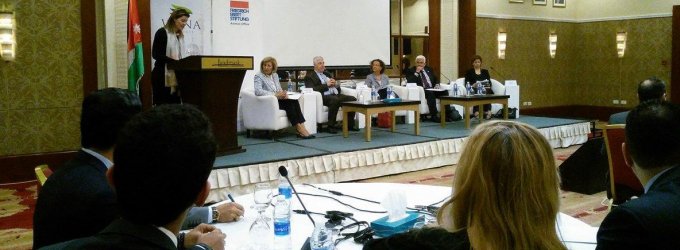-
A Sustainable Future for Jordan: Implementing the SDGs ...
A Sustainable Future for Jordan: Implementing the SDGs after the Voluntary National Review
On 19 October 2017, the West Asia – North Africa Institute (WANA) and Friedrich-Ebert-Stiftung (FES) hosted a high-level panel discussion on Jordan’s efforts to achieve the Sustainable Development Goals (SDGs) by 2030. The event was held under the patronage of HRH Prince El Hassan bin Talal.
The panel consisted of H.E. Eng, Ziad Obeidat, Acting Secretary General of Planning and International Cooperation; H.E. Ms Costanza Farina, UNESCO Representative to Jordan (Chair of the UNCT SDG focus group); Dr Mohammad Saidam, Chief Scientist at RSS and Ms Hala Kilani, representing the Climate Action Network (CAN). The panel was moderated by H.E. Mrs Haifa Al Najjar, Senator at the Jordanian Senate House - The Upper House of Jordanian Parliament. Dr Jawad Anani, former Deputy Prime Minister, gave the keynote speech on behalf of HRH Prince El Hassan bin Talal.
In his opening speech Richard Probst, Deputy Resident Director of FES in Amman, stressed that “the 2030 Agenda for Sustainable Development has the transformative ambition and the potential to change our planet. Therefore, a public debate in Jordan about these goals is highly welcome. Since Energy, Water and Climate Change are cross-cutting issues that are fundamental to all of the Sustainable Development Goals and central to development, security, and poverty reduction in Jordan, this conference is of utmost importance.”
H.E. Ms Costanza Farina stressed that “nobody can achieve the SDGs alone. Our tendency is to work in our comfort zones, but in doing so, we end up working in silos. This tendency cannot be sustained. We need to work in solidarity.”
What is Next on Jordan’s Path to Sustainability?
In July, Jordan presented its Voluntary National Review (VNR) report to the High-level Political Forum on Sustainable Development at the United Nations in New York. The VNR facilitates multi-stakeholder partnerships and details the country’s plan to implement the SDGs. “Jordan’s report was one of the best ones presented,” H.E. Eng. Ziad Obeidat pointed out. “Jordan is the only country that addressed children in its VNR.”
The panel discussed the next steps forward after submitting the VNR, and which efforts are needed. “The next phase will be full of challenges,” Obeidat remarked. “We have our strategies to turn these challenges into opportunities, and we need the support of the international community to accomplish this. The next phase will also be integrating capacity-building and community awareness raising, as well as focus on strengthening the statistical system in Jordan to implement the SDGs at the local and national levels.”
The speakers also focused on the role of science in implementing the SDGs. “A scientific dimension was used when drafting the SDGs," Dr Mohammad Saidam noted. "As the SDGs are highly interconnected, their implementation is rather complicated, yet essential to address in order to achieve sustainable development.”
“We cannot achieve the SDGs in Jordan unless science is mainstreamed in all implementation stages and there is a good relationship between policy-makers and members of the scientific community, both exact sciences and social sciences,” he concluded.
Ms Hala Kilani discussed the importance of fully involving both civil society and the private sector as partners in implementing the SDGs. “Civil society in Jordan suffers from the lack of access to information. We need a knowledge hub that provides civil society with easy access to coordinated and uniform information from various ministries,” she stated.
“We also need to develop a real partnership with the private sector,” she continued. “People knock on their door only when they need money, but they are not involved in policy-making. We need to reach out to the private sector and let them know they have a real stake in the development process.”

